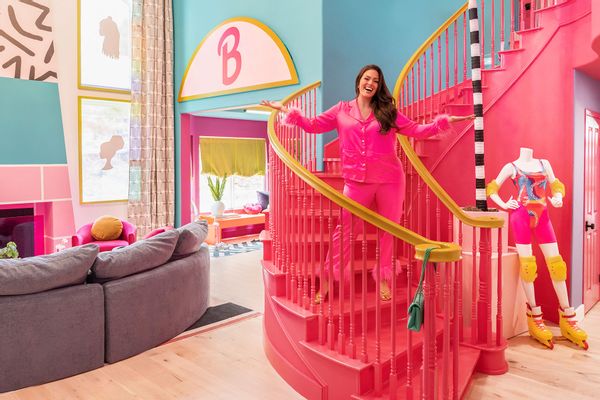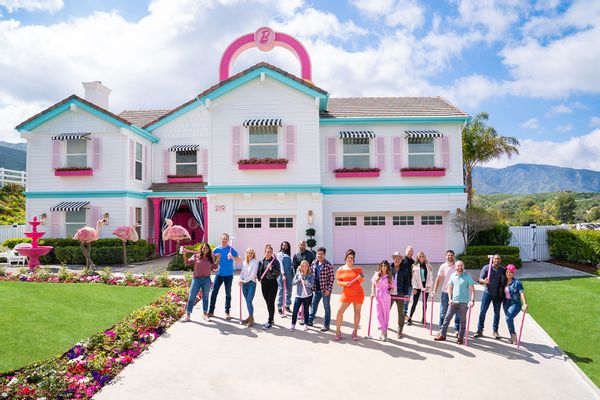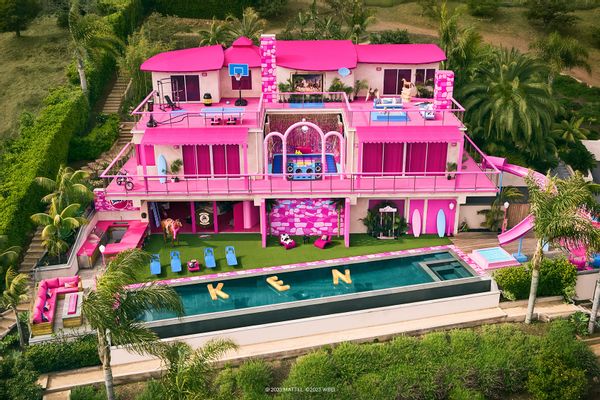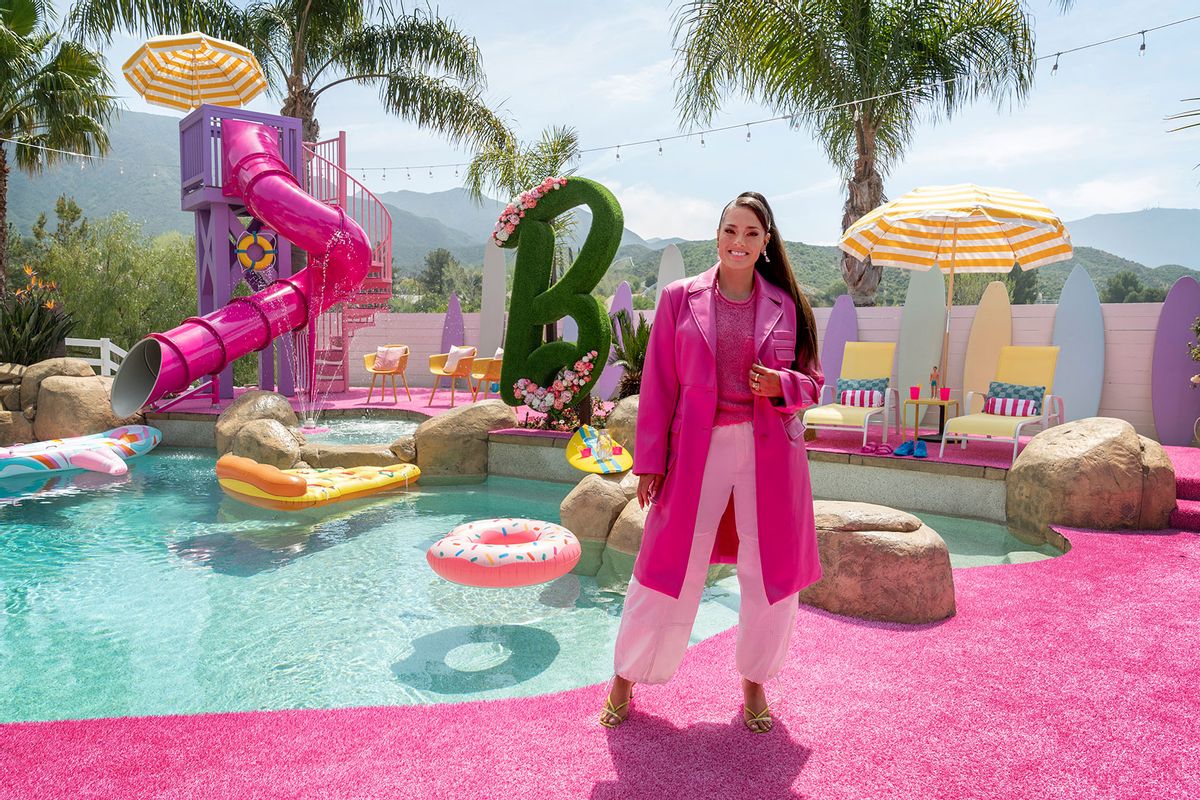Barbie’s first dreamhouse had no kitchen. The one-room, single-story 1962 home contained everything a teenager requires for fun, including a Hi-Fi TV console with a record player, a bed, a simple couch, and the obligatory closet. But there are also books, LPs and pennants identifying her as a college graduate.
By HGTV standards, Ms. Barbie Millicent Roberts’ starter palace was dinky. It was also indisputably her own, popping in toy stores a full year before the Equal Pay Act was passed to protect women against pay discrimination in the workplace. More than a decade later, in 1974, the Equal Credit Opportunity Act opened up access to loans and credit for women, enabling more unmarried women to purchase property without a male co-signer.
The natural next statement should be along the lines of the real world catching up to Barbie’s make-believe one, and that’s true to a degree. The Barbie aficionado’s response to accusations of the doll’s anti-feminist bent might cite the inaugural dreamhouse’s relationship to history.
“You can really tell that each dreamhouse is representative of what’s popular in architecture and design in that period,” explains Barbie historian Whitney Mallett in an Architectural Digest video breakdown of the Dreamhouse’s evolution over time. “And it also tells kind of a cultural narrative of what’s going on.”
It’s true. Where classic dollhouses were intended to prepare girls for a life of domesticity Barbie’s den prioritized good times.
Plus, her space was entirely hers and affordable, retailing for between $4.44 and $8, or between $31 and $81 in 2023 dollars.
The Santa Clarita, Calif. house transformed for HGTV’s “Barbie Dreamhouse Challenge” reflects the doll’s modern digs – multiple rooms on multiple floors. A prominent staircase in the entryway. A fireplace. A closet large enough to live in. The now-obligatory pool. And pink, many shades of it, everywhere.
 “Barbie Dreamhouse Challenge” host Ashley Graham in the entry (HGTV)
“Barbie Dreamhouse Challenge” host Ashley Graham in the entry (HGTV)
There’s also a kitchen. But that suits the needs of Food Network star and “Top Chef” competitor Antonia Lofaso, who is among the TV pros – mainly HGTV rehab show stars — tasked with inflicting their creative interpretations of era-specific Barbie design on assigned sections.
HGTV’s real estate makeover shows have sold luxuries as commonplace amenities for years. The “Barbie Dreamhouse Challenge” simply amplifies that illusion.
The show will end after four episodes but one lesson that may linger is a nagging sensation of how sneakily Mattel’s iconic toy houses influenced America’s design expectations. Mattel originally conceived of the Dreamhouse for entirely capitalistic reasons, correctly deducing that kids lucky enough to get one would bother their parents to buy more Barbies for the original homeowner to play with. No doll is an island, after all.
But the fascination revolving around this particular dollhouse is a product of the give-and-take between an era’s cultural climate and the story told by the material produced in that time. The enlargement of the Dreamhouse would seem to reflect that Barbie’s dreams grew with the possibilities available to women but in hindsight, and a lot of HGTV viewing, the product’s stealthiest influence may be the way it instills in us early on a connection between success and excess.
Don’t misinterpret this as blaming Barbie for out-of-control real estate prices or the sprawl of McMansions jammed into exurban subdivisions. That would have happened regardless of whether some Mattel executive dreamed up the idea to turn a shoebox into a miniature pre-Helen Gurley Brown bachelorette pad.
The expansion of the Barbie Dreamhouse through the decades, however, reflects our changing notion of what constitutes a status symbol, including the toy itself, which now retails for $199. Barbie moved from modest midcentury digs to a place in Malibu, and as she excelled in her various careers, her life necessitated the addition of multicar garages, en suite bathroom jetted tubs and elevators.
 Barbie Dreamhouse Challenge”: Mika and Brian Kleinschmidt, Jasmine Roth, Antonia Lofaso, Anthony Elle Williams, Michel Smith Boyd, Kristina Crestin, Jonathan Knight, Ashley Graham, Alison Victoria, Ty Pennington, James Bender, Evan Thomas, Keith Bynum, Mike Jackson and Egypt Sherrod (HGTV)
Barbie Dreamhouse Challenge”: Mika and Brian Kleinschmidt, Jasmine Roth, Antonia Lofaso, Anthony Elle Williams, Michel Smith Boyd, Kristina Crestin, Jonathan Knight, Ashley Graham, Alison Victoria, Ty Pennington, James Bender, Evan Thomas, Keith Bynum, Mike Jackson and Egypt Sherrod (HGTV)
HGTV’s real estate makeover shows have sold such luxuries as commonplace amenities for years, making them seem as easy to obtain and install as the compressed time it takes between demolition and reveal. The “Barbie Dreamhouse Challenge” simply amplifies that illusion.
“Barbie Dreamhouse Challenge” is part of the full-court promotional press for Greta Gerwig’s “Barbie” movie, for which the studio has been fluffing the audience’s excitement like a marabou feather boa for what feels like a year.
Each team’s room must contain a “playetic,” i.e. those over-the-top fancy features that we expect to come standard in smart homes and Kardashian caves. The “Dreamhouse Challenge” crib holds a compartment that rises out of the countertop at the touch of a button, a light-up dancefloor and stained-glass windows featuring her silhouette.
But even if you aren’t among the superfans for whom the HGTV teams are competing, or if you haven’t thought about Barbie for . . . never . . . the array of deep dives into the film’s design aesthetic announce this as a project to be taken seriously.
Want a daily wrap-up of all the news and commentary Salon has to offer? Subscribe to our morning newsletter, Crash Course.
Architectural Digest also released a seven-and-a-half-minute video feature in which the movie’s star Margot Robbie walks viewers through the movie’s version of the Dreamhouse that functions as an appetite-whetting preview and a home tour. It’s also an explainer that reveals the logistical reason behind every stylistic choice, down to why the Barbie world’s homes have no walls.
The real world’s approximations of the Dreamhouse have no intellectual rationale for the items you find in them. Instead they revert to the original point of their ridiculous opulence – it’s all about living inside of rose-colored fun.
It’s all about living inside of rose-colored fun.
Also thanks to the “Barbie” movie, Airbnb is offering a room’s worth of that experience for rent – Ken’s, according to the listing. The HGTV competition series’ winning team earned the Barbie fans who they championed a four-day, three-night stay inside the home.
The rest of us can rent which, though I’m sure will be about as tough to do as scoring tickets to a Taylor Swift concert once booking officially opens (Monday, July 17 at 10 a.m. Pacific Time, in case you’re interested) has to be more affordable than purchasing a life-sized Dream.
 Ken’s Malibu Barbie DreamHouse on AirBnb (Hogwash Studios/Mattel)
Ken’s Malibu Barbie DreamHouse on AirBnb (Hogwash Studios/Mattel)
Since there’s no official address to pull into a county property records database we can only conservatively Zestimate (har har) what a place like this would cost. By checking the “must have pool” box on that famous real estate site and eliminating the modest choices that popped up (two bedrooms? As if!) this network-rehabbed project might fetch somewhere around $1.5 million. Yes, in this economy.
Alternatively, a living doll can opt to buy some paint, thrift a few frills, and tap into their imagination. Like the classic jingle once assured kids, we girls (and Kens) can do anything. If we can afford it.
“Barbie Dreamhouse Challenge” premieres at 8 p.m. Sunday, July 16 on HGTV.
www.youtube.com/watch?v=uKgaVlMN7IY

